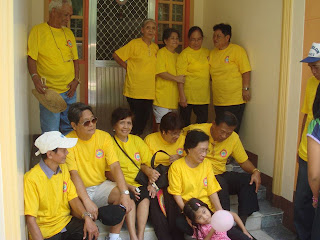OFWs keep Christmas lights aglow
By Casiano Mayor Jr.Philippine Daily Inquirer

CHRISTMAS LIGHTS go up as early as September in the De Vera family home. L-R: Alex de Vera, wife Edith (fourth, left), daughters Sofiah (second, left), Kaithlyn (third, left), Ayesha (right) and son Adrian.
“We start fixing our Christmas tree when ‘ber’ steps into the calendar,” says Alex in their home, a three-bedroom rented flat in Jeddah’s Musreffah district. “We keep our Christmas tree in a storeroom, along with the decorations, and set it up usually in September.”
Although practicing religion apart from Islam is not allowed in Saudi Arabia, Christian Filipinos have kept the Christmas tradition alive in the privacy of their homes. There are no lanterns or parols hanging outside doors and windows but the Christmas tree is ubiquitous in every Christian Filipino’s living room.
It’s actually no hassle getting a Christmas tree in this oil-rich kingdom. Synthetic Christmas trees, well-kept in boxes, are sold in variety stores in commercial centers that cater to Filipinos. And Christmas lights are sold in big supermarkets.
That makes it easy for the family of Jonathan Padua to change their Christmas tree almost every year. “We started with a tiny Christmas tree years ago and then it became bigger and bigger as years went by,” says Jonathan. “Christmas trees and decor are found in shops popular among Filipinos.”
What Pinoys miss
What the Filipinos in Saudi Arabia miss are the din of rush-hour Christmas shopping, the Misa de Gallo, traditional rice cakes like puto bumbong and bibingka sold in the vicinity of churches, the sound of firecrackers, San Miguel beer or Carlsberg and the exasperating heavy traffic. But food is in abundance here and parties abound.
Parties in Jeddah are held a few days before or after Christmas Day in Filipino restaurants, homes or resorts with private villas. The Christmas Eve noche buena is usually reserved for the family and close friends.
When the parties fall on a Thursday, which is equivalent to Saturday in the Philippines, they usually last until the wee hours or the first crack of dawn, with the partygoers sleeping on Friday, the rest day in Saudi Arabia and other Muslim countries in the Middle East.

PARTIES AND GAMES with close friends is the usual Padua family activity. From right, Jonathan Padua, daughter Jannis, wife Wilma and son Jan Lorenz.
Decorating their homes
Home for the Sayases is a rented apartment where Christmas garlands and Christmas stockings are tacked up by his wife Juliet on doors and walls, along with other Christmas decor. “We inherited the garlands from a friend who had left for good but the other decor were made by Juliet,” Ahjid quips.
The Sayases and other Christmas celebrants shop for gifts a few weeks before Christmas Day, but buy their groceries for noche buena a day or two before Christmas Eve because traffic is relatively light in Jeddah and most of the Filipino families here have cars. Those who don’t, usually the new comers, can easily take the taxi cabs.
And what do the Sayases prepare for noche Buena?
“We usually have soup and cheese sticks for starters. Beef, chicken, fish and seafood dishes for the main courses. Sweets include buko pandan, which I prepare, and brazo de mercedes, courtesy of Juliet,” recalls Ahjid.
Biko and spaghetti
For the De Veras, who prefer “solemn moments” on Christmas Eve, Alex says, “it’s what the Filipinos usually have for noche buena back home. There are a lot of dishes which Edith prepares but I can’t really recall all.”
So Edith, his wife, butts in: “It depends. I prepare when Christmas Day falls on a Friday, the rest day, and the children have no classes. I prepare pansit, biko, chicken teriyaki, beef barbeque, salad and of course spaghetti for the kids. This Christmas, which falls on a weekday, I may prepare just enough for dinner on Christmas Eve because the following day they won’t be at home. That’s when you think of Christmas in the Philippines.”
The Paduas had not made up their minds on what food to prepare for this year’s noche buena but Jonathan says, “last year the ones I can remember were kaldereta, roasted Peking duck, afritada, ube, veggies, among others.” The Paduas spend Christmas Eve with close friends. They call each other up before Christmas Eve to decide in whose house they will hold a joint celebration.

SAPIN-SAPIN AND BUKO PANDAN will be on the noche buena spread of the Sayas family. From right, Ahjid Sayas, wife Juliet and son Jeremy.
Although Christmas celebrations here are not wanting when it comes to food and things that money can buy, the season brings a deep sense of longing for the home country. It is a time when memories are prone to fly on the wings of nostalgia to the families left behind—the parents and siblings, nieces and nephews, and even friends. It is the time when the impulse to make an overseas call reigns.
“Here, there is lots of food… but this also makes you think of the families back home, of what they have for the noche buena, and wish that they have as much as we have on our dining table,” says Ahjid.
“There’s a sense of longing, a void somewhere in our hearts. With loved ones around, even a simple celebration is grand.”
Like most Christian Filipinos in Saudi Arabia, the Sayases make long-distance calls to their families in the Philippines on Christmas Day.
“Well, the celebration here is fine, OK na rin. But it’s really different in the Philippines. The children miss so many things,” says Alex, who has four children—a boy and three girls, aged 12 to 5, the youngest of whom has not yet spent Christmas in the Philippines.
Shorter celebrations
“In the Philippines, you feel the Christmas atmosphere throughout the season. Here, you feel the excitement of Christmas only on Christmas Day itself and then everything returns to normal until the New Year when we have another celebration.”
“We always celebrate Christmas wherever we are. However, we feel Christmas to be happier when our relatives and loved ones are celebrating this special day with us,” says Johathan, whose family has spent Christmas in the Philippines only twice since they came to Jeddah in 2000.
“Definitely, Christmas in the Philippines is merrier. You can feel the Christmas ambiance throughout the season. Christmas carols are played everywhere, you can see Christmas decorations wherever you go and feel the family excitement at the malls. Here, Christmas ends right after Christmas Day.”
This Christmas, which falls on a Sunday, the Filipinos will spend Christmas Day at work, except for those who may take a leave of absence for lack of sleep. What will remain to remind them of the Yuletide are the leftovers and the Christmas trees that will stay in their living rooms until the Feast of the Three Kings.
Below is the Inquirer's link to the story
OFWs keep Christmas lights aglow















